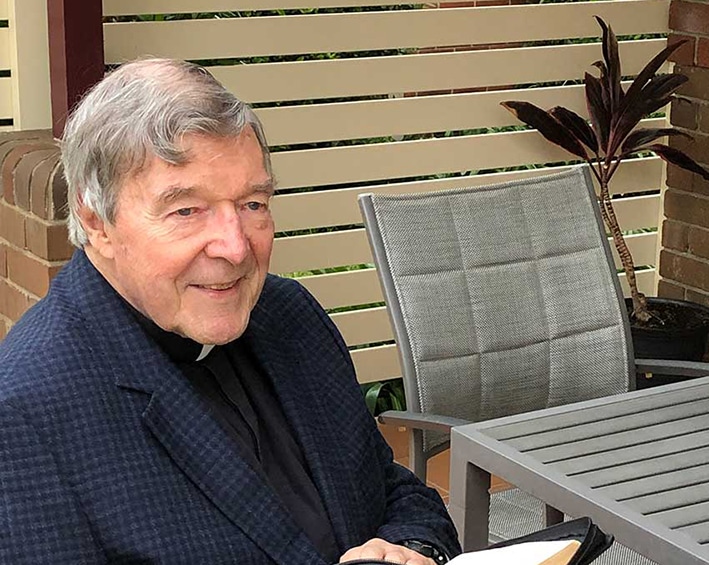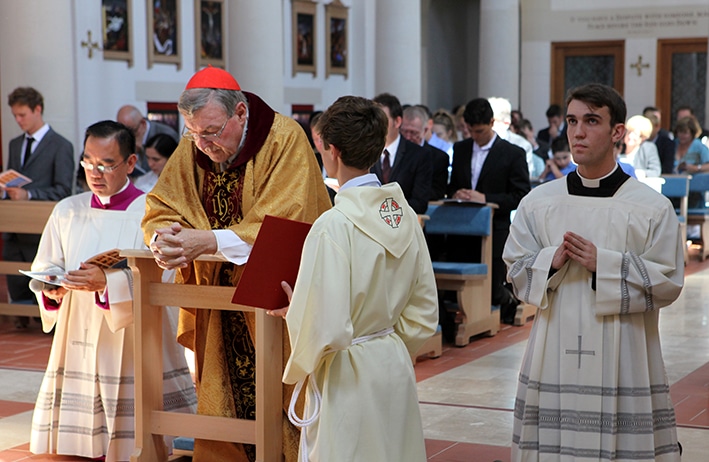
Looking for Cardinal Pell? You only had to go to the chapel
Whenever Archbishop Anthony Fisher would visit Cardinal George Pell in Rome or Sydney, the first place he’d look for his friend was in the chapel.
“Whenever he had any spare moments, that’s where he was sitting. He was very dutiful in his prayer,” Archbishop Fisher told The Catholic Weekly.
“It reflects his generation: you had to make sure you had celebrated your daily mass, and you’d said all the hours of the Divine Office, and your daily rosary, and you did your hour of mental prayer, and you did spiritual reading.
“Those were an absolute priority in his life. And it meant whether it was early in the morning or late at night, if he had any spare time at all, or time he could make for himself, that’s where he was: in the chapel.
“I think he was a genuinely very prayerful man. The only way you can make sense of how he got through 400+ days in prison and came out the other end an even better man, rather than an angry and embittered and hurt man, was that it was like a big, long retreat for him … a time of prayer.
“He knew how to do that. He didn’t come to the prison experience with no ideas about how to fill your time. He knew about prayer.”
Reflecting on the styles of piety, spirituality and leadership of his friend and mentor Cardinal Pell, Archbishop Fisher said the Cardinal’s sense of spirituality was formed by the broad Catholic tradition.
“He loved the tradition. He would read the Office of Readings, including the Fathers of the Church. Because he did his doctoral studies on the patristic period, the early period of the Church’s history, he had read those writers,” Archbishop Fisher said.
“The tradition fed him, and its spirituality. He loved Newman. And of course, being a good Catholic, he loved Thomas Aquinas.
“Another favourite was St John Fisher. The Cardinal often read his works and spoke about him.
“And I would say that while it was an intellectual faith—he was an intelligent and very well educated man who read ravenously, more books per week than anyone else I knew—it was in some ways a very old-fashioned piety.
“There had to be the daily rosary, images of the cross and of the sacred heart and so on—what you’d imagine would have been the spirituality of 1940s-50s Ballarat, as well as the learning that came with his years in Rome and Oxford and all the rest.”
Cardinal Pell’s faith also committed him to another of his core beliefs: that the unity of the Church was paramount.
Despite the characterisation of the Cardinal as a deliberately-polarising figure, Archbishop Fisher said there were many battles he wouldn’t fight because they would damage the unity of the Church.
“Some of his own team, as it were, would have been annoyed, wanting to hear him up front and loud,” Archbishop Fisher said.
I think he was a genuinely very prayerful man. The only way you can make sense of how he got through 400+ days in prison … was that it was like a big, long retreat for him.”
– Archbishop Fisher OP
“It was a priority for him above all because he was a disciple of Jesus Christ and believed in the Church as One, Holy, Catholic and Apostolic.
“He deeply believed that there is one Catholic truth, and one Church, and one Lord, and one baptism, and that it is a terrible break with what Christ did for us, has done for us, what God has given us, when we go off and start our own show, do our own thing.
“George would have none of that! He was very clear that it’s the teachings of Jesus Christ we’re here to hand on, not our own latest inventions or opinions.
“That annoyed a lot of people, because they thought it was pugnacious or traditionalist, but I think it was above all about unity: about there being one Church and one Lord.”
Archbishop Fisher first came into contact with Cardinal Pell while studying for the Dominicans in the late 1980s in Camberwell, Victoria. The Cardinal was, at that point, Auxiliary Bishop of Melbourne under Archbishop Frank Little. He asked the young Anthony Fisher to give him some tutorials on bioethics. “That was very intimidating for me, as a seminarian! He was also probably wanting to get to know me,” Archbishop Fisher said.

After he returned from completing his doctorate at Oxford and was lecturing at the Australian Catholic University, then-Father Fisher was invited to the “kitchen cabinets” that were part of Cardinal Pell’s leadership style.
“It’s a feature of the Cardinal and of his leadership that outsiders don’t often get that he liked to have around him people he regarded as talented and having ideas,” he said.
“Very different to a lot of leaders I’ve known—including in the church—who are intimidated by having talent around them and want to shine by making sure everything around them is unimpressive.
“He would insist that it would help his own performance to have people around him with ideas, including that would contradict him, who would push him to do things and think differently.
“So I think I was just one of a quite large number of people who he had in his circle, from whom he would draw ideas, and have almost gladiatorial games with.
“He’d call us together and get people to argue over some issue, or have a kind of think tank over some issue.”
“There’s a sense in which from quite early in my own Church life, he was in one way or another an encouragement, a mentor.”
Related:
Peter Rosengren: we loved Cardinal Pell more than the world hated him
Cardinal Pell’s faith, suffering remembered at Vatican funeral
